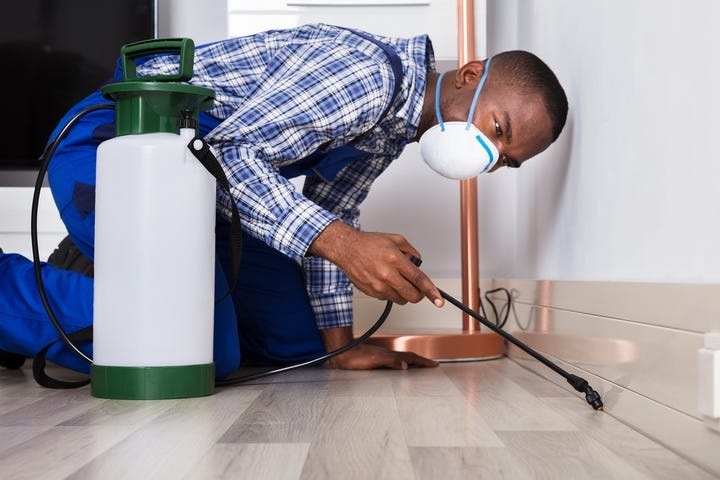Efficient Bed Bug Treatment: Eliminate Infestations Securely!
Wiki Article
Specialist Bug Control Techniques for Long-Term Outcomes
In the realm of pest control, attaining continual efficacy and lasting outcomes needs a meticulous approach that transcends plain elimination. Professional bug control methods envelop a comprehensive approach that begins with a thorough examination and analysis, followed by exact bug identification to comprehend their habits patterns. The execution of Integrated Pest Management (IPM) concepts, combined with eco-conscious therapies, creates the foundation of sustainable insect removal. The true examination lies in the recurring tracking and maintenance of the dealt with areas, making certain a pest-free setting for the direct future. By delving right into the ins and outs of these strategies, a deeper understanding of expert bug control techniques for sustaining end results emerges.Inspection and Assessment
Upon entering a building for pest control services, the preliminary step is a comprehensive assessment and evaluation to determine the level of the infestation and establish one of the most effective treatment plan. Specialist bug control technicians are trained to carefully analyze the properties, seeking indicators of insect activity such as droppings, chomp marks, nests, or any kind of architectural damage. They will certainly also evaluate the problems that might be attracting parasites, such as food resources, water leakages, or access factors.
Insect Identification and Behavior

Moreover, comprehending the behavior of the determined pest is vital to implementing effective control actions. Recognizing where parasites nest, what they feed on, and their task patterns can assist pest control professionals Clicking Here devise methods to eliminate them efficiently. Some pests might be nocturnal, while others are extra energetic throughout the day. This knowledge permits the application of treatments at optimal times for maximum performance.
Integrated Parasite Monitoring (IPM)
Integrated Parasite Monitoring (IPM) strategies incorporate several techniques to control and protect against pest invasions in a sustainable and eco-friendly manner. exterminator. By integrating methods such as organic control, habitat manipulation, alteration of cultural techniques, and making use of resistant selections, IPM aims to reduce making use of chemical pesticidesOne of the crucial concepts of IPM is the focus on avoidance. This aggressive method involves monitoring bug populations frequently to find any kind of potential problems prior to they intensify. By recognizing pest issues beforehand, pest control measures can be carried out promptly and effectively.
In addition, IPM advertises making use of non-toxic pest control techniques whenever possible. This can consist of using natural predators of the parasites, introducing helpful insects, or making use of scents to interrupt breeding patterns. By reducing dependence on chemical pesticides, IPM not just secures the setting but likewise assists maintain an equilibrium in the ecosystem.
Environmentally-Friendly Therapies
Implementing eco-conscious strategies in insect control procedures can efficiently attend to problems while prioritizing environmental sustainability. Environmentally-friendly therapies focus on reducing the impact of parasite control techniques on ecosystems, non-target organisms, and human health. These approaches usually entail using all-natural killers, such as ladybugs or nematodes, to manage pest populations, minimizing the need for chemical interventions. Furthermore, strategies like habitat adjustment, such as changing dampness degrees or removing food resources, can help hinder parasites without using hazardous materials.An additional trick facet of environmentally-friendly treatments is using organic and naturally degradable items that damage down rapidly without leaving unsafe deposits in the environment. Agricultural pesticides stemmed from plants like chrysanthemums or neem supply effective parasite control while positioning minimal danger to non-target types. Utilizing approaches like warm treatments or scent traps can target certain parasites with accuracy, minimizing the overall ecological effect of insect control practices.
Recurring Monitoring and Maintenance
ContinueRegular examinations by skilled experts are needed to determine any indications of pest activity, assess the performance of previous therapies, and make changes to the bug control strategy as required. By checking insect populations over time, bug control experts can track fads, expect potential problems, and implement precautionary steps to minimize the danger of future problems.
In addition to monitoring, upkeep techniques are vital for lasting bug control success. This includes executing appropriate sanitation measures to remove possible food and water resources for insects, securing off entrance indicate avoid pests from entering the properties, and addressing any architectural concerns that could help with bug infestations (Exterminator DC). By integrating ongoing tracking and upkeep right about pest control into an integrated parasite administration method, services can ensure a pest-free setting and secure their home versus expensive damage and health and wellness risks
Verdict
Finally, using specialist parasite control strategies such as detailed examination and assessment, exact bug recognition and understanding of their behavior, incorporated insect management techniques, environmentally-friendly treatments, and ongoing surveillance and upkeep are necessary for attaining long-term results in parasite control. By applying these techniques, individuals can efficiently handle insect invasions and preserve a pest-free environment in a lasting manner.Report this wiki page